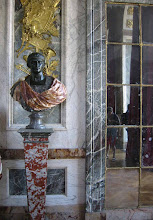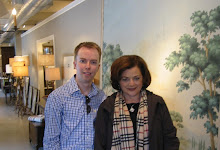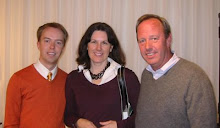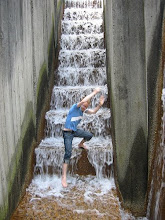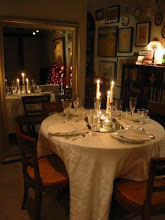As Thanksgiving is upon us I wanted to share a fitting place from my last European trip -the Hofburg Palace King's apartment museum in Vienna.
Located right on the edge of historic city center, the Hofburg palace complex was built upon from the 14th century up until the end of the Hapsburg empire in 1918 to become the epicenter of the government. As you can imagine it is immense!The entrance to the museum is under the green dome above through a tight hallway in the St. Michael's wing - apparently grander entrances still serve other governmental purposes. The tiny entry barely could coral the hoards of people jockeying to see the collections. It was as crowded as a Macys the day after Thanksgiving!
The first part of the tour is through the extensive pantries of the palace: acres of cabinetry holds the Emperors' china, silver, and gilt-ware used over the centuries.
Some of it was rather familiar and ordinary, if lovely, such as the 19th century porcelain above.
However other offerings were as exotic and extraordinary as the far reaches of the Hapsburg dynasty. A large service of china for the short-lived Hapsburg Emperor of Mexico is seen above. Wouldn't you like to set your Thanksgiving table with this?!
As with all monarchies nothing impresses more than gold. The museum holds the largest collection of gilt-ware in the world. That's sterling silver covered in a thin layer of gold. Until the late 19th century the Hapsburgs ONLY ate official meals on and with gold, porcelain was reserved for dessert. Seriously.
The lovely cruet above has little stands for the lids which you can see if you zoom in. Who said gilt-ware wasn't practical?
Extensive quantities of silver are laid out showing the amount of tableware required for numerous coursed meals. Daunting to say the least.
Room after room held display cases with more and more spectacular stuff. How many gilt candlesticks could one emperor possibly need?
Some of my favorite china was the most 'simple' - well at least more neoclassic. Simple is a relative term when dealing with the Hapsburgs!
Surprisingly a lot of the things seemed quite modern like the Biedermeier coffee service below dating from 1822.
My favorite china service was perhaps this set which had a different castle or chateaux painted on each plate.
I could see Martha Stewart collecting this 18th century faux bois china from the Vienna Porcelain Manufactory.
A surprising thing to learn was that the emperors each had their own commissioned tableware -but rather than a set for each castle they traveled with it. Each item has a corresponding travel case!
How is that for economizing? haha
All of these items were of course hand made and cost prohibitive even centuries ago so they were royal commodities.
Sometimes the cases were more interesting than the items they contained.
As the collection spans centuries there is something to everyone's taste.
How about some Agyptisieren (German for Egyptian Revival) from 1810.
This time period had tons of the famous Austrian crystal. Lobmeyr is just down the street afterall (talk about tempting! be sure to visit their top floor which houses their museum collection).
There were dozens of table top decorations like the set above. So impressive! The Government still uses much of this for state dinners. In other words, sometimes in your lifetime manage to get invited to an Austrian state banquet!
Part of what made the collection so great was the labeling. I always wonder 'what was this strange glass or fork used for?'. Well the museum is here to tell you!
The green glass goblets were reserved for the local Rhine wine.
Around every corner was more and more china from the short-lived Emperor of Mexico.
Did I mention how much I like this? I suppose as his reign was so short there wasn't much chance for breakage before he was executed.
Much like the current fascination with Princess Diana the Austrians still have an obsession for their last empress Elisabeth, known as Sisi. A large part of this museum is devoted to this rather odd monarch who died a century ago. Did I mention the hoards of people? Above is a statue of her with her husband Emperor Franz Joseph. As highly recommended as it came I could have easily skipped this portion of the tour and stayed in the pantries.
The takeaway above is that the Hapsburgs had a lot of gold which equals money and power. How about some of these very understated gold candlesticks for your Thanksgiving table? I bet your table would break in half.
I had to share more of the china depicting different palaces. Above is their main summer palace Schonbrunn, located just outside of Vienna, which I also visited (and where Marie Antoinette was raised).
Above is the nearby picturesque Belvedere which I also visited. Today it houses an excellent modern art museum and beautiful gardens.
There was a sterling silver tag for every type of wine you could imagine. I wish they sold some of these in the gift shop!
I highly recommend this portion of the museum although I could have happily left after the pantries. A century later, the Hapsburgs still impress; I hope you enjoyed these treasures!























































.jpg)



















.JPG)


























































